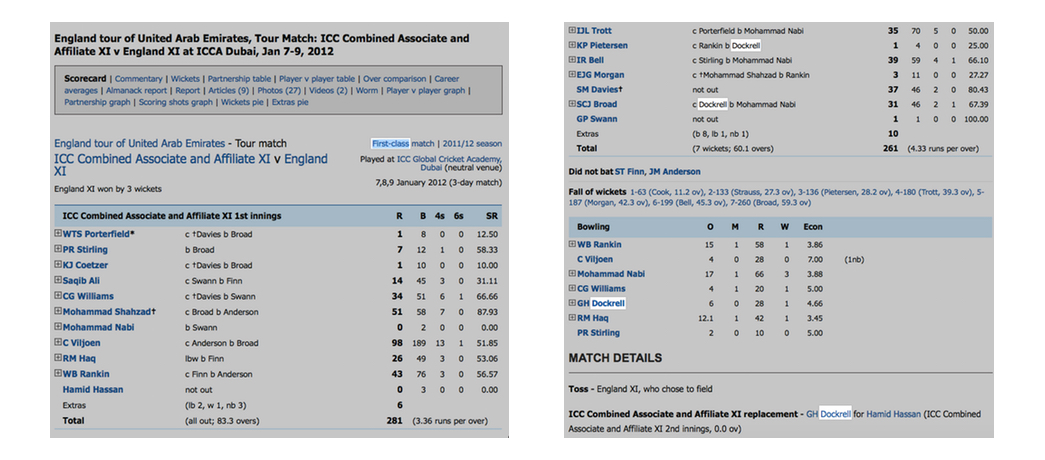The trouble with Ostarine: Jimmy Wallhead’s
16th March 2018
Features


On the day of an independent review commissioned by Cricket Australia into the death of international batsman Phillip Hughes, an investigation by The Sports Integrity Initiative has learnt that the governing body of cricket in South Africa will introduce a concussion substitute policy into its domestic first-class competition. Earlier today Cricket Australia announced that it too would formally propose a concussion substitute be allowed in first-class matches.
The moves come despite the ICC’s regulations expressly forbidding the use of substitutes for injury – including concussion – in first-class cricket, with previous reports that the global body would withdraw first-class status of those matches where substitutes were used.
Under the ICC’s Classification of Official Cricket, first-class matches must be played between two sides of eleven players, and the only instance in which a playing member can be substituted to bat and bowl ‘without the match forgoing its first-class status’ must ‘relate solely to a player’s call-up to or release from international duty’. The ICC specifically states that no playing members may be replaced for reasons of injury.
In a statement issued to The Sports Integrity Initiative, Dr Shuaib Manjra, Chair of Cricket South Africa’s (CSA) Medical Committee, said that CSA had made the decision after “considering the short and long-term health and legal risks associated with concussion”.
Last year the National Football League (NFL) in the United States of America agreed a US$1 billion settlement, without admission of liability, in order to compensate players suffering brain injuries as a result of playing American football. In 2014, the High Court in Dublin approved a €2.75 million damages settlement to a schoolboy who suffered serious head injuries playing school rugby.
“The health and safety of our players is of paramount interest to us as a cricket association,” continued Dr Manjra, who confirmed that the decision was made in a meeting of its Cricket Committee last month. “The incidents that we have seen on the cricket fields recently and the experience of other sports such as American Football should be a lesson to us that the precautionary principle is paramount.”
Cricket has recently suffered a spate of concussions after blows to the head in first-class matches. Just two weeks ago Australian international and Middlesex captain Adam Voges was hospitalised after a ‘freak head injury’ caused by an errant throw in the field. Australian opener Chris Rogers was concussed twice in two months last year after being hit on the head while batting.
“The current laws of the game prohibit substitutes in cricket but we will engage with the ICC on this topic. We believe they too will consider the matter from a player health and safety perspective.”
Tony Irish, CEO of both the South African Cricketers’ Association (SACA) and the Federation of International Cricketers’ Associations (FICA), said that this was a move that has received strong support from both organisations. “We believe the ICC’s regulations on first-class cricket classification need to be reviewed in order to accommodate the introduction of concussion substitutes,” Irish told The Sports Integrity Initiative. “Policies dealing with concussion should be medically and scientifically grounded.”
In response, a spokesperson for the ICC said that, while it acknowledged the risk of concussion in cricket, that the number of concussions sustained in the sport are “generally very low, particularly in relation to other contact sports”. The ICC believes that the current Laws and its playing conditions ensure that, when a player sustains a serious head injury, “he gets the best medical advice and treatment”, but that player substitution was a “broader issue” and that the ICC’s regulations had “not changed for many years”.
However the ICC told The Sports Integrity Initiative that it is in fact “considering the best approach to issuing concussion management guidance to its members,” but one of the biggest hurdles it has to overcome is “producing guidance that can be implemented and managed across the game”.
While the ICC may be worried about the implementation of a concussion substitute, to many the leniency with which the ‘international duty’ stipulation is approached is in stark contrast to the outright refusal to allow a substitute in an instance where a batsman is hit on the head by a 90 mile per hour cricket ball.
Recently there have been concerns by both players and the media that the allowance of substitutes for players being called up for international duty is being abused, and used to disguise fatigue and workload concerns, giving teams an unfair advantage.
“I think people find it hard to digest when people get pulled out because they are going on tour, and they haven’t bowled enough and they are using it [a domestic match] as a live fitness test,” said Ed Cowan, the former Australian international and current opening batsman for New South Wales.
“But someone gets hit in the head, gets concussed, and they can’t be replaced in the same round, at the same time, and sometimes even in the same game?” asks Cowan, who was concussed and retired from a first-class match in Australia earlier this year when he was struck on the head while batting. “Then I think people struggle to register which direction the game is heading in.”
This is not the first time that questions have arisen as to the consistency with which the ICC applies its official classification of first-class cricket, and its persistent rebuttal of efforts to allow concussion, or injury, substitutes. In January 2012 an England XI played an ICC XI in Dubai when the Afghanistan fast bowler, Hamid Hassan, collided with a picket fence surrounding the ground, causing serious injury. He was replaced by George Dockrell, officially the ICC XI 12th man, but who was then allowed to bat, bowl and field. The ICC retained the first-class status of this match.

A Cricket Australia spokesman confirmed to The Sports Integrity Initiative that in 2012 they had “campaigned unsuccessfully” to introduce a structured concussion substitutes replacements code. A plan to trial a formal substitutes system was reportedly aborted after senior figures were ‘made aware’ that the premier Sheffield Shield competition would lose its first-class status if the move went ahead.
An ICC spokesperson said that a further Cricket Australia proposal to introduce injury substitutions in first-class cricket was rejected by the ICC Cricket Committee in 2014 with very little support.
Cricket Australia said that its position on concussion substitutes remains unchanged. Following the release of the independent Curtain review into Phillip Hughes’ death, Cricket Australia, in a similar vein to Cricket South Africa, have once again proposed that a concussion substitute be introduced in first-class cricket, despite the ICC’s current stance.
Both the England and Wales Cricket Board (ECB) and Cricket Australia have informal concussion protocols in place which stipulate that ‘any player with a suspected concussion must be removed from the field of play and undergo stepwise assessments’.

However both players and administrators at the national level are becoming increasingly frustrated, and disillusioned, with the disconnect between the ICC’s refusal to allow substitutes and the strict concussion protocols enforced by the national boards.
“There are people far brighter than me that know the ramifications of getting hit in the head,” said Angus Fraser, the Managing Director of Cricket at Middlesex, speaking after Adam Voges’ concussion. “But the fact is that it is your responsibility to look after your players and do what is best for your players.
“To some extent you could be compromised by the desire to win or avoid defeat in a game of cricket,” said the former England fast bowler. “I think a player is more likely to hide the fact that they have been concussed and that can’t be good.”
For many players, it is considered a badge of honour to play on and ‘knuckle down’ when faced with injury and adversity. “Shows the character of the bloke,” said New Zealand fast bowler Neil Wagner after Australian captain Steve Smith was struck on the head but batted on in a Test match earlier this year. Cricket Australia said that in this instance all concussion protocols were met and passed by Smith.
“The Laws and Regulations have got to adapt to the modern world. That’s why technology is so involved, because we know so much more than we knew before,” said Fraser.
In an unfortunate coincidence, when Cowan was hit and concussed in Australia earlier this year, Voges was the opposing captain for Western Australia. When Cowan was hit, Voges had come into the New South Wales dressing room and offered to replace Cowan. Cricket Australia, in fear of the wrath of the ICC, told him that such a move would void the game as a first-class match.
According to Fraser a similar discussion took place at Hampshire last week when Voges was concussed. “I think Giles White [Hampshire’s Director of Cricket], and Richard Scott [Middlesex Head Coach] – I don’t know how far they pushed it – were certainly in conversation that morning,” said Fraser. “And it did sound like Hampshire would have been prepared to have allowed us to get a substitute to take full part in the game. Obviously it didn’t get off the ground.”
For Tony Irish, the move by the national cricket boards in the face of ICC inaction is a long time coming. “We believe that cricket should be brought into line with what is happening in other global sports,” said Irish. “I believe that if other boards join with this approach the ICC are likely to review those regulations. I would be surprised if they don’t.”
The ICC claims there are many hurdles to introducing a new rule, such as the difficulty of ensuring its global implementation and management, that it would be “difficult to justify a rule only for concussion and not for other types of injury”, and that it has only failed to act on the issue thus far because it did not want to be seen as a “regime of regulation, policing and sanction”.
With the ICC’s Cricket Committee set to have its next annual meeting on 31 May, the governing body has conceded that it will at least discuss the proposals issued by the national cricket boards.
• The International Weightlifting Federation (IWF) has reported another Adverse Analytical Finding (AAF) as a...
• José ‘Tin’ Angulo has tested positive for a prohibited substance, Spanish club Granada CF...
None of the four major US sporting leagues – Major League Baseball (MLB), the National Basketball...